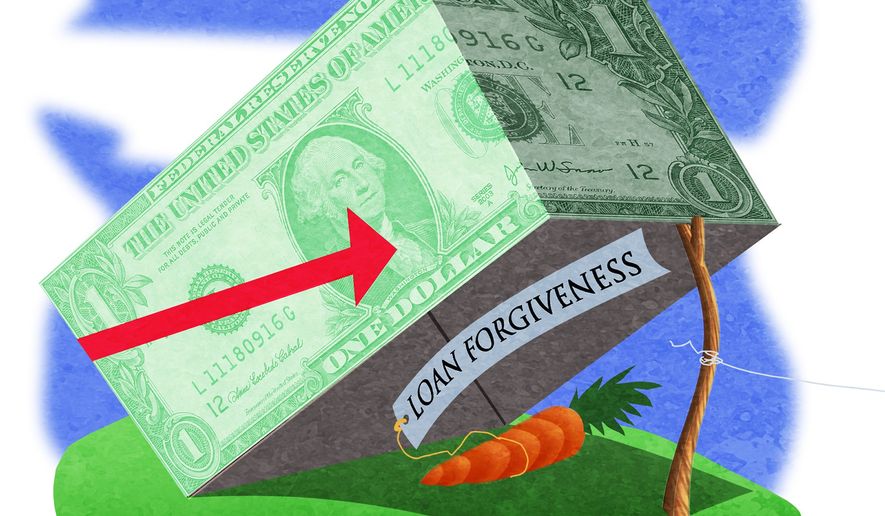OPINION:
Since Congress largely expunged private lenders from making student loans in 2010, the resulting turmoil looks like Wile E. Coyote has been at the helm. At least he had blueprints.
President Joe Biden has taken the folly further by unilaterally authorizing rapid student loan debt forgiveness – something, not even the Acme company could supply.
This clemency follows repeated executive action, spanning the Trump and Biden administrations, extending a pause on student loan repayments. Besides the forgiveness announcement, Mr. Biden also decreed a “final” extension, supposedly ending Dec. 31, 2022.
While Americans currently carrying student debt are probably rejoicing, the student loan system remains unchanged. What happens when future graduates clamor for debt relief? Moreover, universities can count on continued loan forgiveness and raise tuition accordingly.
America’s student debt burden has created serious issues that need correcting. Current student-loan debt tops $1.7 trillion. Taxpayers deserve their money back. Collectively, consumers need relief from the additional inflationary pressure of student debt forgiveness.
For two years, I’ve called for Congress to form a National Commission to study the student loan debt market. There’s still time for them to do so. Instead of watching student debt forgiveness, Congress should pass a bill that reaffirms its exclusive authority to forgive student debt, and provides a practical path forward.
First, require colleges and universities to underwrite and cosign new student loans. With skin in the game, colleges and universities can decide how to restrain tuition growth best. They can also decide the amount of debt they are willing to extend to each student.
Second, set the interest rate on outstanding student debt to zero. Taxpayers would rather earn interest on the money they lent, but getting the principal back is better than Mr. Biden’s ill-conceived (and frankly illegal) forgiveness plan.
Third, all current borrowers must resume payments no later than Jan. 1, 2024. If borrowers begin to repay sooner, all their subsequent payments at, or above, a newly calculated minimum are tax deductible. This minimum could be 5% of net income. Borrowers can choose to make a smaller payment than their minimum, but these lower payments are not tax deductible. Skipping a payment is not an option. There should be a minimum monthly payment of, say, $50. Importantly, payments must continue until the debt is retired.
Finally, we need to know what is happening in the student-loan market. As it did with the National Commission on Consumer Finance in 1968, Congress should now create a new bipartisan national commission—this time charged with studying all aspects of the student-loan market.
Policymakers must recognize that economic incentives matter. Incentivize bad economic behavior — even in the name of “fairness” – and you get more bad behavior. The Biden loan forgiveness plan does just that. The message to borrowers is “Borrow as much as you want. You won’t have to repay it.” The message to university administrators is “Raise prices. The cost of education doesn’t matter because ultimately, the taxpayer will cover it.”
Mr. Biden has given an incentive to universities to raise tuition as much as possible in the coming years. Then, students will take on larger and larger debt until the next president “forgives” it. Taxpayers will foot the bill. How does the government pay for this circus? By printing money? If so, all consumers will pay higher prices due to the resulting inflation.
The cost of a college education has spiraled out of control, but a poorly thought-out debt jubilee does not solve the problem. A bipartisan national commission focusing on the cost of college and the resulting student debt can provide research results to guide Congress toward a long-term solution. In the meantime, Congress should halt this Great Giveaway.
• Thomas W. Miller Jr., is a professor of finance and holder of the Jack R. Lee Chair in Financial Institutions and Consumer Finance at Mississippi State University and a Senior Research Fellow at Consumers’ Research.




Please read our comment policy before commenting.